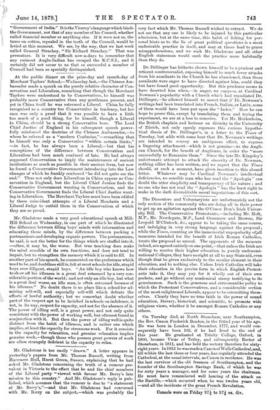At the public dinner on the prize-day and speech-day of
Merchant Taylors' School,—Wednesday last,—the Chinese Am- bassador made a speech on the purely relative character of Con- servatism and Liberalism, remarking that though the Merchant Taylors were understood to be Conservatives, he himself was probably more Conservative than any gentleman present, and yet in China itself he was esteemed a Liberal. China he fully recognised as a country too Conservative in tendency, but her case was only a proof that it was possible to have a little -too much of a good thing, for he himself, though a Liberal in China, should be a strong Conservative here. The Lord Chief Justice of England in his subsequent speech power- fully reinforced the doctrine of the Chinese Ambassador,—to whom he referred as a "modern Confucius,"—remarking that he himself was only a Conservative "within certain limits," —in fact, he has always been a Liberal,—but that his conceptions of the difference between Conservatism and Liberalism had been much confused of late. He had always supposed Conservatism to imply the maintenance of ancient institutions as much as possible in their ancient form, but now he found a Conservative Government introducing into the Law 'changes of which he frankly confessed "he did not quite see the end." Thus not only does Liberalism in China appear as Con- servatism in England, but the Liberal Chief Justice finds the Conservative Government wanting in Conservatism, and the Conservative Government finds the Liberal Chief Justice want- ing in Liberalism. The Merchant Taylors must have been edified by these coincident attempts of a Liberal Mandarin and a Liberal Judge to outbid them in the Conservatism of which -they are so proud.


































 Previous page
Previous page